|
F-15C Eagle
by Scott Snow
|
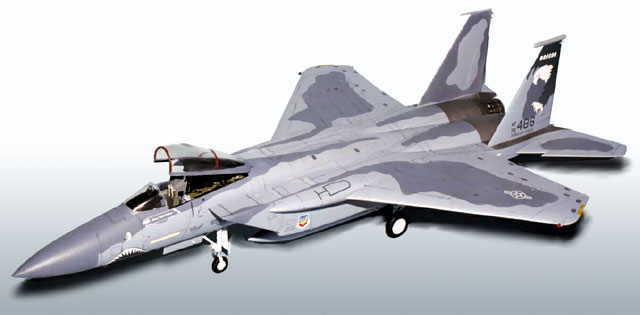
|
|
F-15C Eagle |

Academy's
1/48 scale F-15C Eagle is available online from Squadron
Here is Academy's 1/48 scale
F-15C Eagle.
This kit, which I purchased many years ago, had been sitting on the shelf
and every time I passed it, it called, telling me that it wanted to be
built. Ignoring it for so long, I finally relented after I purchased an
eye catching set of Superscale decals. Since I had also acquired a Black
Box resin detail set, I decided the F-15ís time had come.
Construction started with
the cockpit, and I was more than a little concerned that the resin
cockpit, designed for the Hasegawa kit, would give me fit problems. To my
pleasant surprise, there wasnít anything to worry about. By carefully
sanding the excess resin under the cockpit floor, the whole assembly fit
snugly between the fuselage halves and the ceiling of the nosewheel bay.
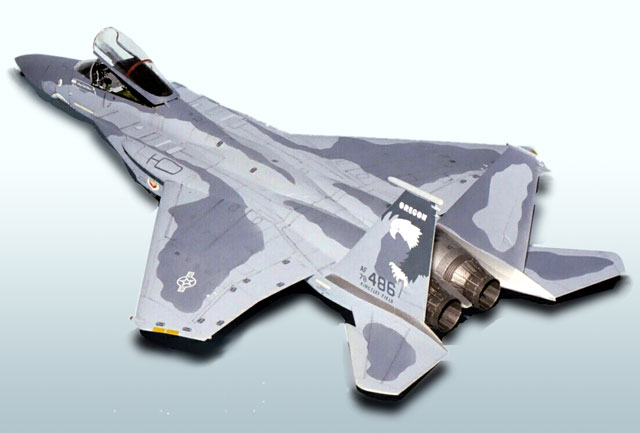
The level of detail in Black
Boxís cockpit set is exceptional; however, the kitís styrene cockpit isnít
all that bad either. It did turn out that the canopy would not completely
close after I installed the resin ejection seat; even after sanding its
base a great deal. I simply left it out until after I had finished
painting the kit.
Academyís kit is nicely
done, with fine recessed panel detail, and overall good fit. I anticipated
some problems where the forward and aft fuselages join, but there was no
step, and seam cleanup was minimal.
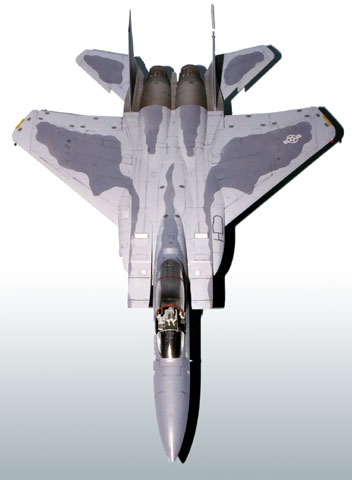 Other
problem areas I encountered during assembly were the left and right
intakes, the wing to fuselage attachment, and both elevator slabs. Both
intakes required extra work with the sandpaper and a touch of filler to
blend with the fuselage. Other
problem areas I encountered during assembly were the left and right
intakes, the wing to fuselage attachment, and both elevator slabs. Both
intakes required extra work with the sandpaper and a touch of filler to
blend with the fuselage.
The wings mate to the
fuselage by means of a slot and tab attachment. The slots offer no
internal bracing causing a weak joint, and the resultant seam does not
coincide with actual panel lines. Consequently, I ruined a lot of surface
detail cleaning up the seams. Re-scribing was easy; however. The problem
with the elevator slabs is that the mating pins are short and way too
small for the attaching holes in the aft fuselage. My solution to this
little problem was to simply butt-join the elevators to the fuselage with
superglue.
The styrene canopy consists
of a separate windscreen and hood; both parts are thin and crystal clear.
The canopy matches the fuselage contour perfectly.
The landing gear is highly
detailed but there were numerous mold release marks that were hard to
clean up.
The kit comes with a full
complement of AIM 9 and AIM 7 missiles, jamming pods, and three external
fuel tanks. To maintain the Eagleís sexy lines, I chose only to attach the
belly tank.
This kit includes both
feathered and featherless exhaust nozzles. Since I was modeling an
aircraft from the Oregon National Guard, the featherless exhausts were
appropriate. Surface detail inside and outside of the nozzles is fairly
well done, but the kitís exhaust petal actuators were oversized and
incorrectly shaped.
I replaced the kit actuators
with ones of my own, made up of fine plastic rod and scrap photo-etched
details.
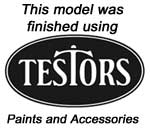 I painted this kit using the
Federal Standard colors (Testors Acryl) called for by Superscale to
represent a ďMod-EagleĒ paint scheme. I painted this kit using the
Federal Standard colors (Testors Acryl) called for by Superscale to
represent a ďMod-EagleĒ paint scheme.
I think there is too much contrast
between the two gray shades, but I was unable to find a picture that gave
me a definitive reference.
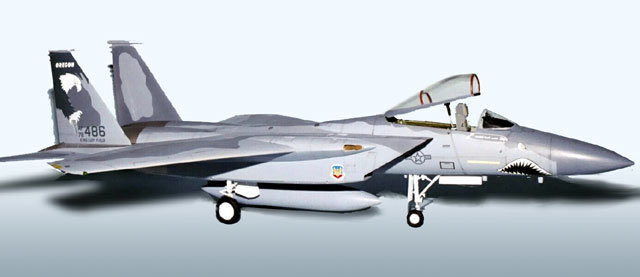
I used Tamiya acrylic paints
for the metal exhaust surfaces, and I was very pleased how well they
represented a real metal surface. I glossed the aircraft with Future and
then used Micro Sol and Micro Set to apply the excellent Superscale
decals.
This turned out to be a
really enjoyable build. The kitís attributes far out weigh its liabilities
and I recommend it highly. A good representation of Americaís premier
fighter aircraft has been long overdue in my collection, and the Academy
F-15 fits the bill perfectly.
Model, Images and Text Copyright ©
2003 by Scott Snow
Page Created 11 February, 2003
Last Updated
17 March, 2004
Back to
HyperScale Main Page |
Home |
What's New |
Features |
Gallery |
Reviews |
Reference |
Forum |
Search